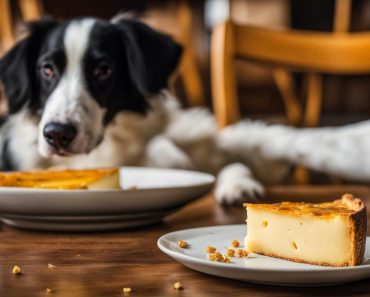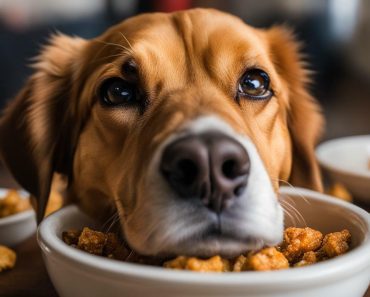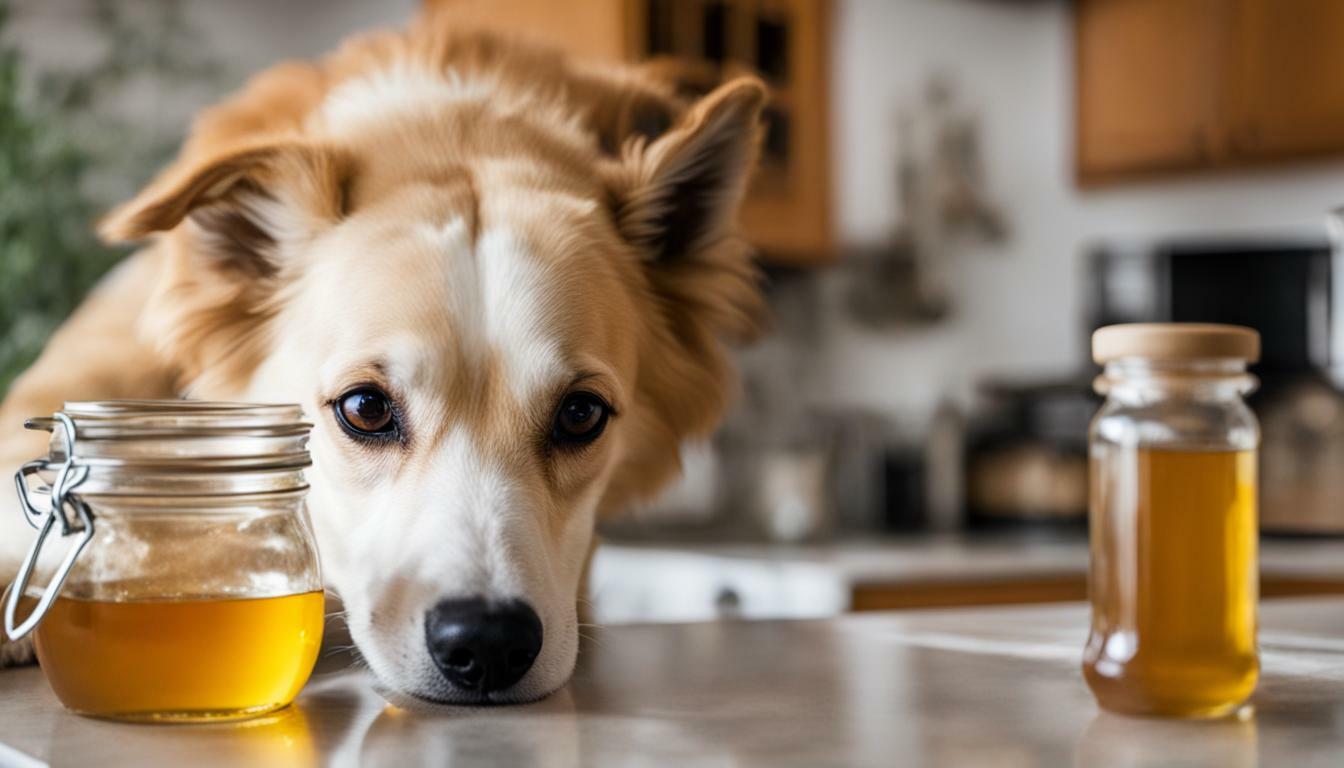
Curious if your furry friend can dogs eat honey? I sort fact from fiction and guide you toward pet-friendly treats for your pooch.
Key Takeaways:
- Honey can be safely consumed by dogs in small quantities.
- Raw honey is preferred over commercial honey for its retained antioxidants and enzymes.
- Dogs should not consume more than a teaspoon of honey a day, and the amount may vary based on their size, breed, and age.
- Honey has natural antibacterial and anti-inflammatory properties, making it beneficial for wound healing, soothing dry skin, and hot spots.
- Honey should be avoided in dogs with diabetes or obesity, puppies, dogs with compromised immune systems, and those allergic to bee stings.
Benefits of Honey for Dogs
Honey has several benefits for dogs, including its natural antibacterial and anti-inflammatory properties, making it a useful ingredient for wound healing, soothing dry skin, and managing hot spots. The enzymes found in honey can help prevent the growth of harmful bacteria, promoting faster healing for minor cuts and abrasions. It can also provide relief for dogs with allergies or skin irritations, helping to reduce redness and itching.
Not only is honey beneficial for external use, but it can also be incorporated into a dog’s diet as a sweet treat. The natural sugars in honey provide a quick source of energy, making it an ideal addition to homemade treats or as a topping for dog food. Additionally, honey contains beneficial vitamins and minerals, including potassium, calcium, and Vitamin C, which can contribute to overall canine health.
Incorporating honey into a dog’s diet can also provide natural remedies for certain health issues. For example, honey can be used as a cough suppressant by adding a small amount to warm water or herbal tea. It can also help soothe a dog’s digestive system, aiding in reducing symptoms of gastric upset or diarrhea. However, it is important to note that honey should be used in moderation and under the guidance of a veterinarian to ensure it is appropriate for a dog’s specific needs.

It’s essential to remember that while honey can be beneficial for dogs, it should only make up a small portion of their overall diet. Treats should constitute no more than 10% of a dog’s daily caloric intake, and honey should not be a regular part of their feeding routine. It is crucial to consult with a veterinarian before adding honey to a dog’s diet consistently, as they can provide guidance on the appropriate dosage and ensure that it aligns with the dog’s specific health needs.
Overall, incorporating honey into a dog’s diet can provide several benefits, from promoting wound healing to adding nutritional value to homemade treats. However, it is important to proceed with caution, monitor the dog’s intake, and consult with a veterinarian to ensure the safety and effectiveness of honey as a pet-friendly treat.
Potential Risks of Feeding Honey to Dogs
While honey can be beneficial for dogs, it is essential to be aware of the potential risks and follow specific guidelines to ensure your pet’s safety and well-being. Here are some dos and don’ts when it comes to giving honey to your furry friend:
- Do consult with your veterinarian: Before incorporating honey into your dog’s diet, it is important to consult with a veterinarian. They can provide guidance specific to your dog’s health and any potential risks or concerns.
- Do practice moderation: Treats, including honey, should only make up 10% of your dog’s daily diet. Too much honey can lead to weight gain, digestive upset, or other health issues. Keep the portion size small and monitor your dog’s intake.
- Do avoid honey for certain dogs: Dogs with diabetes or obesity, puppies, dogs with compromised immune systems, and those allergic to bee stings should not consume honey. It is important to consider your dog’s individual health needs before introducing honey into their diet.
- Don’t use honey as a substitute for medication: While honey has natural antibacterial properties, it should not be used as a replacement for prescribed medication. Always follow your vet’s advice and treatment plans.
- Don’t give honey to dogs under one year old: Puppies have different dietary needs and may not digest honey properly. It is best to wait until they are older before introducing honey into their diet.
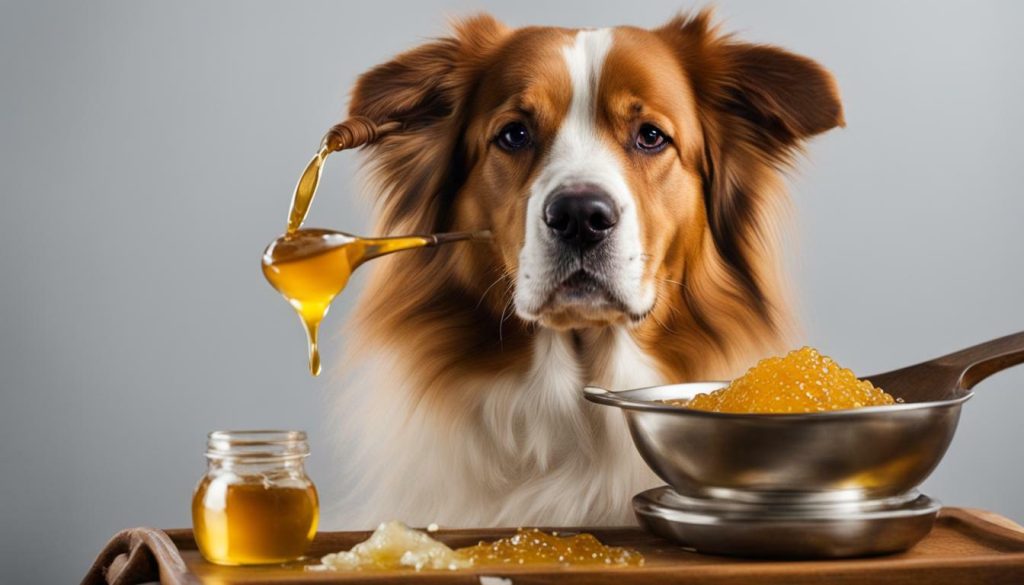
In conclusion, while honey can offer certain health benefits to dogs, it is important to be mindful of the potential risks and exercise caution when incorporating it into their diet. Consulting with a veterinarian, practicing moderation, and being aware of your dog’s specific health needs are crucial in providing safe and pet-friendly treats. By following these guidelines, you can ensure that your furry friend can enjoy the benefits of honey while maintaining their overall well-being.
Incorporating Honey into a Dog’s Diet
Incorporating honey into your dog’s diet can be done in a few simple and creative ways, ensuring they can enjoy the benefits without any negative effects. However, it is important to remember that honey should only be given in small quantities and as an occasional treat. Let’s explore some ideas on how to introduce honey to your furry friend’s diet:
- As a topping: Drizzle a small amount of honey over your dog’s regular food to add a touch of sweetness. This can help entice picky eaters or add a delightful flavor to their meal.
- In homemade treats: Honey can be used as a natural sweetener in homemade dog treats. There are numerous recipes available that incorporate honey into delicious and nutritious treats for your canine companion.
- As a soothing treat: Mix a teaspoon of honey with a little warm water to create a soothing drink for your dog. This can be especially beneficial for dogs with dry throats or as a comforting reward after a long walk or training session.
While incorporating honey into your dog’s diet can be a tasty and beneficial addition, it is crucial to remember that moderation is key. Too much honey can lead to digestive upset or an intake of excess sugar. Always consult with your veterinarian before making any significant changes to your dog’s diet or if you have any concerns about incorporating honey into their routine.

By following these guidelines and being mindful of your dog’s individual needs and health conditions, you can safely incorporate honey into their diet. Remember to monitor their intake and observe any changes in behavior or health. With proper usage, honey can provide your furry friend with some delightful and beneficial treats.
Raw Honey vs. Commercial Honey
When it comes to choosing honey for your dog, opting for raw honey can provide added health benefits due to its higher antioxidant and enzyme content. Raw honey is minimally processed and retains more of its natural properties compared to commercial honey. It is made by beekeepers who extract honey directly from the honeycombs, and it undergoes minimal filtration and heating processes.
One of the key advantages of raw honey is its higher antioxidant content. Antioxidants help protect the body against harmful free radicals and oxidative stress. Raw honey contains a variety of antioxidants, including flavonoids, phenolic acids, and enzymes, which can contribute to your dog’s overall well-being and immune system.
Additionally, raw honey contains enzymes that can aid in digestion and improve nutrient absorption. These enzymes are naturally present in honey but can be lost during the processing and heating of commercial honey. By choosing raw honey, you can ensure that your dog benefits from these digestive enzymes and their potential health benefits.
| Raw Honey | Commercial Honey |
|---|---|
| Higher antioxidant content | Lower antioxidant content |
| Retains enzymes | Enzymes may be lost during processing |
| Minimally processed | Undergoes filtration and heating processes |
While raw honey has its advantages, it is essential to remember that honey should only be given to dogs in small quantities. The recommended amount is no more than a teaspoon a day, and it should not be a regular part of their diet. It is always best to consult with a veterinarian before incorporating honey into your dog’s diet, especially if your dog has any underlying health conditions or allergies.
Overall, raw honey can be a beneficial addition to your dog’s diet when given in moderation. Its natural antibacterial and anti-inflammatory properties, along with its higher antioxidant and enzyme content, can provide health benefits for your furry friend. Just remember to choose raw honey, monitor the dosage, and prioritize your dog’s overall well-being.
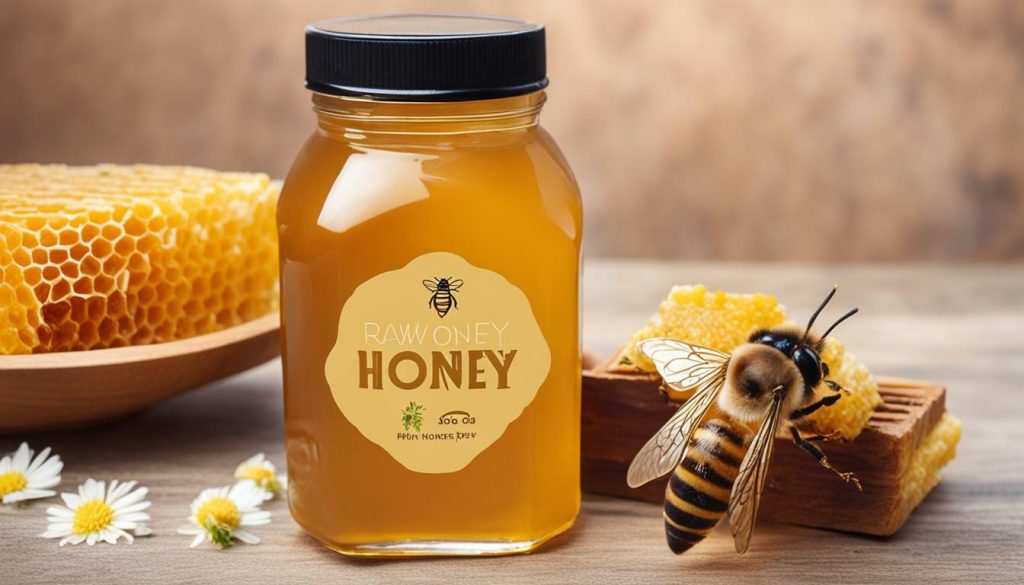
Conclusion
In conclusion, honey can be safely enjoyed by dogs in moderation, but it is crucial to consider individual factors and consult with a veterinarian to ensure the best choices for your pet’s health and happiness.
Dogs are omnivores and can digest plant material, including honey. Raw honey is preferred over commercial honey for its retained antioxidants and enzymes, which can benefit canine health. It is important to note, however, that dogs should not consume more than a teaspoon of honey a day, and the amount may vary based on their size, breed, and age.
Honey has natural antibacterial and anti-inflammatory properties, making it useful for wound healing, soothing dry skin, and relieving hot spots. However, there are certain cases where honey should be avoided. Dogs with diabetes or obesity, puppies, dogs with compromised immune systems, and those allergic to bee stings should not be given honey.
Treats should only make up 10% of a dog’s daily diet, and honey should not be a regular part of their meals. It can be given as a topping for dog food or as an ingredient in homemade treats to enhance their nutritional value. It is always recommended to consult with a veterinarian before adding honey consistently to a dog’s diet and to monitor their intake to prevent digestive upset and other potential health issues.
FAQ
Can dogs eat honey?
Yes, dogs can safely consume honey in small quantities.
Why is raw honey preferred over commercial honey?
Raw honey retains antioxidants and enzymes that can be beneficial for dogs’ health.
How much honey can dogs eat?
Dogs should not consume more than a teaspoon of honey a day, and the amount may vary based on their size, breed, and age.
What are the benefits of honey for dogs?
Honey has natural antibacterial and anti-inflammatory properties and can aid in wound healing, soothing dry skin, and hot spots.
Are there any risks associated with feeding honey to dogs?
Honey should be avoided in dogs with diabetes or obesity, puppies, dogs with compromised immune systems, and those allergic to bee stings. It is important to monitor the dog’s intake to prevent digestive upset and other health issues.
How can honey be incorporated into a dog’s diet?
Honey can be given as a topping for dog food or in homemade treats. It is recommended to consult with a veterinarian before adding honey consistently to a dog’s diet.
Is raw honey better for dogs than commercial honey?
Yes, raw honey is a better choice as it retains more beneficial properties for canine health.

